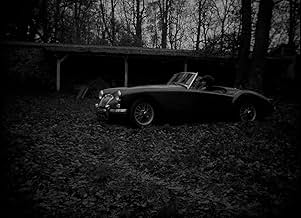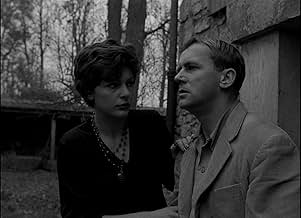ÉVALUATION IMDb
6,7/10
2,9 k
MA NOTE
Ajouter une intrigue dans votre langueThe indiscreet Terry, mistress of an American journalist, revealed to her lovers, Juan and Gérard, something they should never have known.The indiscreet Terry, mistress of an American journalist, revealed to her lovers, Juan and Gérard, something they should never have known.The indiscreet Terry, mistress of an American journalist, revealed to her lovers, Juan and Gérard, something they should never have known.
- Director
- Writers
- Stars
- Prix
- 1 victoire et 1 nomination au total
Louison Roblin
- Ida
- (as Louise Roblin)
Avis en vedette
Rivette is perhaps the least known of the 5 Cahiers directors of the New Wave. I've only seen The Nun before and I enjoyed it. This first feature was disappointing to me. Great location work and photography but way too long. Basically a pretty, naive girl gets involved with a bunch of pretentious a-holes who suggest a suicide was a murder and she tries to play amateur detective. Not in the sense an American film like this would. It's mostly her confronting different people who tell her enough to keep her interested but no evidence is found. The film mentions creeping fascism in the forms of McCarthyism in the US and the Franco regime in Spain. But is it all just paranoia? By the end, I could care less and it turned out to be much ado over nothing (Shakespeare). I don't get what this film was trying to achieve. I assume Rivete was a leftist so is he criticizing them or supporting them? Might have been better with the running time cut and a new ending. This isn't The 400 Blows or breathless or even Le Beau Surge.
:It's 1957. Betty Schneider is a student who gets involved in small acting troupe. As the rehearsals proceed, she notices odd things, and begins to suspect some secret organization is responsible for the death of the American journalist, novelist and music composer for the show, Daniel Crohem.
Jacques Rivette's first feature shows the gelid calm that appeared in most of his movies. with politics and assassination merging in a manner that Hollywood would only tackle in the 1970s.... usually with an air of hysteria. There are a lot of shots around Paris that makes the city a cynical observer of these human goings-on, a subjective camera that views the affair with contempt. I wonder how cameraman Charles Bitsch got that effect.
Jacques Rivette's first feature shows the gelid calm that appeared in most of his movies. with politics and assassination merging in a manner that Hollywood would only tackle in the 1970s.... usually with an air of hysteria. There are a lot of shots around Paris that makes the city a cynical observer of these human goings-on, a subjective camera that views the affair with contempt. I wonder how cameraman Charles Bitsch got that effect.
Anne Goupil (Betty Schneider) is a literature student in Paris in 1957. Her elder brother, Pierre, takes her to a friend's party where the guests include Philip Kaufman, an expatriate American escaping McCarthyism, and Gerard Lenz, a theater director who arrives with the mysterious woman Terry.
Begun in 1957 and completed three years later, it was then-critic Jacques Rivette's first full-length film as a director and one of the first works of the French New Wave, though it was not released theatrically until 1961. Oddly, it seems to be one of the lesser-known today, despite being a fascinatingly odd mystery.
Apparently many people say this film is "like a David Lynch movie". That similarity is there, so I appreciate that... but then the question becomes, does that mean that David Lynch films are "like a Jacques Rivette movie" since Rivette came first by quite a few years?
Begun in 1957 and completed three years later, it was then-critic Jacques Rivette's first full-length film as a director and one of the first works of the French New Wave, though it was not released theatrically until 1961. Oddly, it seems to be one of the lesser-known today, despite being a fascinatingly odd mystery.
Apparently many people say this film is "like a David Lynch movie". That similarity is there, so I appreciate that... but then the question becomes, does that mean that David Lynch films are "like a Jacques Rivette movie" since Rivette came first by quite a few years?
This is an unusual film. It revolves around a group of characters that are slightly connected to each other through their artistic tendencies and/or political beliefs. The group is presented well - it is quite realistic, even though it is so colourful. This is perhaps because the criteria for being part of the group are so 'normal'. Friends, people with similar interests.. acquaintance networks - this is something that is presented very well in the film.
A sinister undercurent pervades the whole movie: a background plot that is never revealed, or shown directly - it is something that the characters speak to each other about and make reference to. While in other movies the conspiracy plot would have been the central theme, here it is pushed into the background, delegated to a simple object of discussion - the movie instead revolves around the lives of the characters and in particular, the protagonist's, from whose point of view the situation is seen. By bringing the focus onto the characters and their daily lives, illusions and aspirations, the movie manages to to breathe fresh life into what would have otherwise been just another conspiracy film.
A few technical things: The acting is not very consistent. The parisian scenes were very good and the photography was aesthetically pleasing. The music enhanced the atmosphere significantly, though some of its psychedelic overtowns were a bit overpowering at points (making the dialogue hard to follow - if the intention was to transfer the confusion/paranoia to the viewer, it was appropriate, however).
It's not a masterpiece, but it is definitely interesting and worth watching at least once.
A sinister undercurent pervades the whole movie: a background plot that is never revealed, or shown directly - it is something that the characters speak to each other about and make reference to. While in other movies the conspiracy plot would have been the central theme, here it is pushed into the background, delegated to a simple object of discussion - the movie instead revolves around the lives of the characters and in particular, the protagonist's, from whose point of view the situation is seen. By bringing the focus onto the characters and their daily lives, illusions and aspirations, the movie manages to to breathe fresh life into what would have otherwise been just another conspiracy film.
A few technical things: The acting is not very consistent. The parisian scenes were very good and the photography was aesthetically pleasing. The music enhanced the atmosphere significantly, though some of its psychedelic overtowns were a bit overpowering at points (making the dialogue hard to follow - if the intention was to transfer the confusion/paranoia to the viewer, it was appropriate, however).
It's not a masterpiece, but it is definitely interesting and worth watching at least once.
This is the second Rivette movie i watch, previous one was "La Belle Noiseuse". LBN is a better movie. PARIS BELONG TO US is a very strange movie but that's something everyone can guess just reading the synopsis and the plot. One can say there are political undertones here or a "Lynchian" vibe, even Kafkaesque. Whereas i don't necessarily disagree, i would say that this is not that political/cryptic/nightmarish. It's more drama than mystery and most of the questions were answered in the ending, even though the answers are not so satisfying.
In any case, i liked it a lot. Pace is very good for a 140 minutes French art movie of the 60's. It's interesting, it made me invest and i was curious to see where it goes. Great as a time capsule, Paris was wonderful. Actors are great. This is one of the movies that you should watch a second time for understanding it completely. I won't though. It's good but it is not THAT good. Pace was good as i said but it should have been at least 10-15 minutes shorter. For a 140 minutes movie, it should have been more intriguing to call it a great movie. And the ending was probably clever but i didn't like it, so much for nothing.
But there was some brilliant dialogue here. Way too cynical for its time of course. I think this is a timeless movie, hasn't aged a bit. Less obscure than it seems. If this description made you curious too, watch it, you won't be disappointed.
In any case, i liked it a lot. Pace is very good for a 140 minutes French art movie of the 60's. It's interesting, it made me invest and i was curious to see where it goes. Great as a time capsule, Paris was wonderful. Actors are great. This is one of the movies that you should watch a second time for understanding it completely. I won't though. It's good but it is not THAT good. Pace was good as i said but it should have been at least 10-15 minutes shorter. For a 140 minutes movie, it should have been more intriguing to call it a great movie. And the ending was probably clever but i didn't like it, so much for nothing.
But there was some brilliant dialogue here. Way too cynical for its time of course. I think this is a timeless movie, hasn't aged a bit. Less obscure than it seems. If this description made you curious too, watch it, you won't be disappointed.
Le saviez-vous
- AnecdotesAs an inside joke, in Les quatre cents coups (1959) the film Antoine Doinel and his parents go to see is "Paris Belongs to Us", which wouldn't be released for another two years.
- GaffesNear the end, when Pierre is on a public phone at Dupleix, a poster near him reads "DIMANCHE 31 MAI" (Sunday 31 May), advertising a meeting of the Parti Socialiste Unifié. May 31st was a Sunday in 1959, and this scene was filmed in late 1958. However, the film is supposed to be taking place in June 1957, so it makes no sense that a meeting is being advertised nearly 2 years in advance.
- Citations
Bernard: You're the guilty ones, with bloodstained hands.
Philip Kaufman: You go too far.
Bernard: Too far? Too far?
Philip Kaufman: What about Mayakovsky? He wasn't Spanish, but he killed himself.
Bernard: Mayaskovsky who?
Blonde à la party: Mayakovsky, wowsky!
[laughs]
- Générique farfelu"Paris belongs to nobody." PEGUY
- ConnexionsFeatured in Cinéma, de notre temps: Jacques Rivette le veilleur: 1-Le jour (1990)
Meilleurs choix
Connectez-vous pour évaluer et surveiller les recommandations personnalisées
- How long is Paris Belongs to Us?Propulsé par Alexa
Détails
- Date de sortie
- Pays d’origine
- Langues
- Aussi connu sous le nom de
- Paris Belongs to Us
- Lieux de tournage
- Pont des Arts, Paris 6, Paris, France(2 scenes on bridge)
- sociétés de production
- Consultez plus de crédits d'entreprise sur IMDbPro
- Durée
- 2h 21m(141 min)
- Couleur
- Mixage
Contribuer à cette page
Suggérer une modification ou ajouter du contenu manquant


































